(https://doi.org/10.55612/s-5002-063)
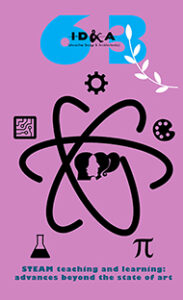

Carlos Aguirre
electrical engineer from the University of Chile with extensive experience in software development, data mining, and educational data analysis. Works at AutoMind, developing apps to support students’ learning and teachers’ didactic practices and doing data science.

Roberto Araya
full Professor at the Institute of Education of the University of Chile. Ph.D. in Electrical Engineering from the University of California, Los Angeles (UCLA). He works in AI applications in education, topic for which he has obtained several international awards.

Antonio Balderas
is an associate professor in the Department of Computer Engineering at the University of Cádiz, where he is also a researcher in the SPI&FM group (Software Process Improvement and Formal Methods). He holds a PhD in Computer Science from the same university. His research focuses on Technology Enhanced Learning (TEL), with a particular interest in learning analytics and the implementation and use of conversational agents in higher education. Prior to his academic career, he gained valuable industry experience as a project manager in several Spanish IT companies.

Alexander A. Barón
professor of the Systems Department of the Faculty of Engineering at the University of Nariño (San Juan de Pasto, Colombia). PhD in Systems Engineering and Informatics (National University of Colombia); Master’s degree in Computer Engineering (EAFIT University); Software Development Specialist (EAFIT University); Systems Engineer (Incca University of Colombia). Research areas: Software Engineering.

Andre Bester
is a multidisciplinary professional with extensive experience spanning various fields and industry sectors. Over the years, he has taken on roles such as research engineer, project manager, technical manager, business owner, and consultant. His expertise includes system integration, underwater acoustic transducer design, renewable energy systems, and the development of serious simulation gaming. André is passionate about leveraging technology to enhance autonomy, purpose, and meaning in human lives. He is driven by environments that foster innovation within ethical frameworks and is committed to contributing to knowledge, sustainability, and prosperity. His specialties include electronic design, signal processing, sensor systems, cognitive testing, and virtual reality systems, among others. André is also an experienced educator in electronics and computer technology and has a strong interest in applying advanced technologies to support education and decision-making.

Carlo Maria Carbonaro
is an Associate Professor with the Physics Department, University of Cagliari where he received the Ph.D. degree in physics in 2000. His research is focused on the optical characterization of dielectrics and semiconductors with both bulk and porous structures, organic and inorganic fluorescent materials for photonic applications. He is author of more than 150 scientific papers, one international patent, and is involved in research projects supported by the European Community and the Italian Ministry of Education, University and Research. He is also co-funder of two spin-off of the University of Cagliari.

Karla G. Cedano-Villavicencio
is Electronic Systems Eng. She obtained She M. Sc. in Computer Science and the PhD in Eng. and Applied Sciences with a specialty in Materials. Her research lines are Innovation and Sustainability, and Energy and Society with a gender perspective. She was Executive Director of the Prolaif-Lamonthe Group; Dir. of Scientific-Technological Development of the Gov. of the State of Morelos; Project Dir. at Corrosion and Protection Eng.; Head of the Dissemination and Extension Unit at the UNAM Campus Morelos; General Dir. of Inno-Ba, and Secretary of Technological Management and Liaison of the Inst. of Renewable Energies of the UNAM. She is a member of the Academy of Social Sciences and Humanities of the State of Morelos and former president of the National Solar Energy Association. She is responsible for the Innovation and Futures Laboratory of the IER-UNAM; Administrative Manager of the Mexican Center for Innovation in Solar Energy; member of the Int. Women’s Forum and Secretary Counselor of Voz Experta.
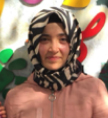
Şeyma Betül Çelik
graduated from Yıldız Technical University Computer Education and Instructional Technology Department in 2008 and completed her master’s degree at Süleyman Demirel University. Her master’s thesis is titled “The Effect of Robotic Programming Education on Learner’s Critical Thınking Skills at The Secondary School Level”. Şeyma Betül ÇELİK currently works as an ICT Teacher at the Atabey Adult Education Center in Isparta. ÇELİK has written 1 book chapter. She has worked as a coodinator in various research projects in schools affiliated with the Ministry of National Education.

Juan Diego Cerrón Salcedo
electronic engineer CIP 162832 studies carried out at the Catholic University of Santa María de Arequipa, I have a Certification of Specialist in Industrial Maintenance Management, a study carried out at TECSUP. I have a Master’s degree in Automation and Process Control and Instrumentation at the National University of San Agustín (December 2017). I also have a Certification in Digital Manufacturing from the FAB ACADEMY 2017 course. I have 8 years of professional experience: in a processed food company S.A. of the Cervesur corporation, mining contracting companies Engineering and Construction as SSK “Cerro Verde Production Unit Expansion Project” and as a speaker for the Department of Electricity and Electronics at TECSUP in training programs. Teacher in digital manufacturing, electricity, electronics, industrial automation at TECSUP. I am currently National Head of Digital Manufacturingx Laboratories in the area of the Vice-Rectorate of Research at Continental University.
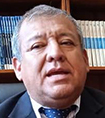
Luis Collantes
Ph.D. in Applied Sciences with a specialization in Mathematical Engineering from the University of Concepción (Chile) and a Master’s degree in Mathematics from the Pontifical Catholic University of Peru. A researcher in mathematical modeling and systems development, he completed a research fellowship at the Institute of Mathematics
A at the University of Stuttgart (Germany). He has held prominent academic leadership roles, including Academic Vice Chancellor and Dean at the National University Pedro Ruiz Gallo. He is the author of numerous publications in high-impact scientific journals.

César A. Collazos
professor of the Systems Department of the Faculty of Electronic and Telecommunications Engineering at the University of Cauca (Popayán – Colombia). PhD in Computer Science (University of Chile); Systems Engineer (University of Los Andes). Coordinator of the IDIS Research Group – University of Cauca. Coordinator of the HCI-Collab Network (Collaborative Network to support teaching-learning processes in Human Computer Interaction at the Ibero-American level). President of the Colombian Computing Society (2019-2020).
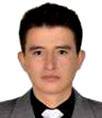
Joaquin De los Rios Rosado
mechanical engineering student at the Universidad Continental aspecializing in digital manufacturing, electronics, programming and the Internet of Things, taking part in the Fab Academy, an educational program run by the Center for Bits and Atoms (CBA) at MIT. He participated in social programs such as AllinchayLab at UC, impacting more than 500 children from the most remote communities in Peru.

Sandra Del-Pozo-Arcos
is a Spanish electronic engineer with a Master’s Degree in Research in Systems and Computing Engineering. With five years of experience as a Specification and Testing Engineer for naval combat systems, she has developed a keen interest in exploring innovative educational methods. Her current research focuses on the use of gamification as a learning tool for database education, investigating its impact on both engagement and knowledge acquisition.

Muhammet Demirbilek
is a Professor of Educational Technology. He is a diverse thinker with 20+ years of achievement in academia and international funded projects and research space. His experience includes a range of computer games and simulations, artificial intelligence, learning analytics social networks and virtual worlds. He earned his doctoral and master’s degree in Educational Technology from the University of Florida. He worked as a Post-Doctoral Researcher at the University of Wisconsin-Madison and University of Florida. Prof. Demirbilek holds B.S. and M.S. degrees in electronics engineering from Istanbul University.

Mario Díaz
professional with a degree in Social Communication, with experience in educational research projects and data analysis. Works in teaching and learning cognitive and communication skills in elementary school students, particularly in strategies to develop student´s inner voice and metacognitive skills.
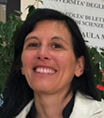
Daniela Fadda
is a research analyst in the Department of Pedagogy, Psychology and Philosophy at the University of Cagliari. She received a PhD in Cognitive and Personality Psychology from the University La Sapienza in Rome and a PhD in Education from the University of Cagliari. Her research experience includes the study of well-being, school adjustment, motivation, dropout and educational technology. Her scientific interests include also methodology and statistic for human sciences with particular reference to structural equation modelling and meta-analysis.

Juan G. González-Serna
obtained his B.S. degree in computer systems from the Acapulco Institute of Technology (ITA-TecNM), Mexico, in 1992, his M.S. degree in computer science from the CENIDET Mexico, in 1995, and his PhD degree in computer science at the Computing Research Center, National Polytechnic Institute (CIC-IPN), Mexico in 2006. He is a member of the National Researchers System (SNI) Level 2. He works at TecNM/CENIDET Computer Science Department as a researcher and professor. His research field is focused on Human-Computer Interaction, affective computing, sentiment analysis, and User Experience Evaluation. He also supervises master’s and PhD theses in the same field.

José Eder Guzmán-Mendoza
holds a PhD in Computer Science. He is a full-time professor at the Polytechnic University of Aguascalientes, and belongs to the Master of Science Programme in Engineering in the areas of Networks and Systems. He is also leader of the Information Technologies and Telecommunications academic body (UPA-CATIT). His current research interests include Software Engineering, Human-Computer Interaction, Educational Technologies and E-Learning. He is also a full professor at the Autonomous University of Aguascalientes, in the Department of Philosophy and Letters of the Meddle School Center.

Alberto Hananel
holds a PhD in Mathematics from the University of Granada (Spain), awarded with the distinction of International Doctorate, alongside specialisation studies in Applied Statistics for Research. He is a full-time faculty member at the Department of Engineering of the Catholic University of Santo Toribio de Mogrovejo (Peru) and a substitute lecturer and researcher at the Department of Mathematical Analysis, University of Granada. His research interests include numerical methods, partial differential equations, multivariate statistics, and artificial intelligence. Dr Hananel is the developer of the “Hananel’s Method” and has received numerous international awards and scholarships for academic excellence throughout his career.

Sonja Holmer
Master’s degree in Cognitive science, is affiliated with the Educational Technology Group at Lund University Cognitive Science (LUCS). She has previously conducted research on instructional technology, and has been working with the Educational Technology Group at Lund University.

Kaspian Jakobsson
has a Master of Science in Engineering, Information and Communication Engineering Technologies from LTH, Faculty of Engineering, Lund, Sweden. He has specialized in the technical implementation of complex conceptual designs in Virtual Reality at both Ericsson and Edda Knowledge.

Jair Jesús León Lucano
graduated in Advertising and Multimedia from the Catholic University of Santa María,
specialized in sound branding and costumer behaviorist. Currently pursuing a
Postgraduate Degree in Administration (MBA), with a mention in Marketing and Sales
Management. Winner of the best paper at the CBER conference in London 2023 and
creator of the Artificial Intelligence Soniry IA incubated by the University of Lima and
Berkeley-Haas Entrepreneurship Program. Interested in cinematography and dialectical
historical materialism and a scholar in the approach of ethical marketing practices as
well as cultural development and improvement of education in technological social
sciences and humanities, additional lines of research in market and consumer
psychoanthropology.
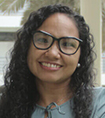
Sandra Loaiza
Master’s degree in Educational Sciences with a specialization in Cognitive Psychopedagogy, and Licentiate and Bachelor’s degrees in Statistics from University Pedro Ruiz Gallo (Peru), along with studies of specialization in Applied Statistics for Research. She is a faculty member in the School of Engineering at the Catholic University of Santo Toribio de Mogrovejo, where she teaches Statistics. Her expertise includes statistical consulting for clinical and academic projects, with publications on strategic management and educational quality.
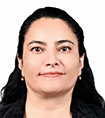
Ivonne Johana Lozano-Prado
is a systems engineer and specialist in technology education, with a master’s degree in education and ICT, focused on e-learning. With more than 22 years of teaching experience at varied educational levels, he has designed and implemented training programs that integrate emerging technologies to improve learning. Currently, she is an aspiring doctor in educational sciences, researching the impact of digital technologies on teaching.

Andrea Magadán-Salazar
obtained her Master degree in Computer Science with specialty in Artificial Intelligence from Centro Nacional de Investigacion y Desarrollo Tecnologico (Cenidet) and her PhD in Universidad Rey Juan Carlos in Spain. Andrea Magadan-Salazar currently works at the Department of Computer Sciences, Centro Nacional de Investigación y Desarrollo Tecnológico. Andrea does research in Algorithms, Artificial Intelligence and Computer Graphics. Their most recent publication is Mechatronic Integral Ankle Rehabilitation System: Ankle Rehabilitation Robot, Serious Game, and Facial Expression Recognition System.
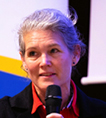
Jessica Niewint-Gori
is the Head of the Research Department for Innovative Teaching Methods and principal Researcher of international and national research projects focused on STEM education and laboratory teaching with INDIRE (the research institute of the Italian Ministry of Education), Florence, Italy. In her 22 years of research with INDIRE, Her research spans from the use of il emerging technologies in the classroom to integrated STEAM education with a primary focus on the development of models and innovative methods to support student-centered approaches for fostering transversal skills and promoting personalisation, inclusion, and well-being in the classroom.
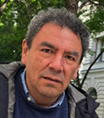
Ernesto Pacheco-Velazquez
is a professor at the School of Engineering and Sciences and a researcher at the Institute for the Future of Education. He holds a degree in Mathematics, two master’s degrees (Mathematics and Industrial Engineering), and a PhD in Operations Management, for which he earned Summa Cum Laude honors and the “Torre de la Excelencia” award as the top graduate student of his class. He is the creator of educational tools such as the GOAL Project platform, V-Logistics, the LOST Logistics Simulator, and the PRO-Game production game. His work focuses on educational innovation projects in logistics, supply chain, and optimization. His contributions have been recognized internationally, earning awards from ICHEI-UNESCO, Reimagine Education, the University of Wharton, and Tecnológico de Monterrey. Additionally, he is a member of Mexico’s National System of Researchers.

Francesca Pestellini
political scientist and PhD in Law. Throughout her career she has worked in various capacities with national and international institutions. Since 2019 she has been collaborating with Indire and is engaged in research projects related, in particular, to innovative teaching methodologies and practices, Media Education and STEAM integrated teaching. Author of a monograph and of various contributions published in national and international journals and volumes

Lucia Rabago-Mayer
is a technical expert at the BMSLab, University of Twente, where she bridges the gap between technology and social sciences. With a strong background in programming, Lucía has been instrumental in translating complex research in psychology, political science, public administration, and communication sciences into technical applications since joining the lab in 2018. She has led the development of immersive VR and AR experiences using Unity, ensuring their seamless integration and functionality. In her current role, she oversees the technical workflows of the department’s development team, establishing pipelines and processes that support both education and research initiatives. Driven by innovation and a commitment to interdisciplinary collaboration, Lucía contributes to impactful projects at the intersection of technology and social sciences, advancing the academic and research mission of the University of Twente.

Oscar Revelo-Sánchez
associate professor in the Systems Department of the Faculty of Engineering at the University of Nariño (San Juan de Pasto, Colombia). PhD in Electronic Sciences (University of Cauca); PhD in Advanced Information Technology (University of Castilla-La Mancha); Master in Computing (University of Cauca); Master in Operations Research (Galileo University); Specialist in Educational Multimedia (Antonio Nariño University); Systems Engineer (Mariana University). Research areas: Systems optimization, HCI.

Virginia Rodes-Paragarino
earned her PhD in Equity and Innovation in Education from the University of Santiago de Compostela, with a focus on decolonizing frameworks for Open Digital Education. She is Research Professor in Lifelong Learning at the Institute for the Future of Education Europe in Spain. She has served as Chairholder of the UNESCO Chair in Open Education and as coordinator of the Virtual Learning Environments Program and the Interdisciplinary Center for Open and Accessible Educational Resources at the Universidad de la República in Uruguay. Her work has significantly contributed to advancing open and inclusive education across Latin America. Her active participation in these prominent networks underscores her role in promoting global open digital education, with a particular emphasis on equitable access to lifelong learning for all.

Carole Salis
has graduated from the University of Montreal, Canada where she has specialized in the field of Educational Technology. She has been a researcher at the Centre for Advanced Studies, Research, and Development in Sardinia (CRS4) since 1993. She studies and designs systems and approaches based on Instructional System Design, leveraging technological innovation to enhance teaching and learning. She is the scientific coordinator of the RIALE project, which evaluates the impact of understanding experimental processes remotely accessible to high school students. This initiative is part of the broader IDEA project (Innovazione Didattica e Apprendimento – Didactic Innovation and Learning), aimed at strengthening the integration of technological innovation in schools by supporting teachers in experimenting with new practices, methods, and tools based on a critical and thoughtful use of digital technologies.

Margarita Tecpoyotl-Torres
received her B.Sc. degree in Mathematics and completed all credits of the B.Sc. degree in Electronics from the University of Puebla (BUAP), Mexico, in 1991 and 1994, respectively, and her M.Sc. and Ph.D. degrees from the National Institute of Astrophysics, Optics and Electronics (INAOE), Mexico, in 1997 and 1999, respectively. She has diplomas in Intellectual Property (IMPI-UAEM) and in Entrepreneurial Training (TREPCAMP). She has also an Entrepreneurship Simulator Certification (TREPCAMP). She participated in the Full Immersion Program in Silicon Valley, USA, in 2014 and Leaders in Innovation Fellowships, UK, in 2015. In 1999 Dr. Tecpoyotl joined the faculty of the Center for Research in Engineering and Applied Sciences (CIICAp) of the Autonomous University of the State of Morelos (UAEM), Mexico, where she is currently a full professor and academic coordinator of the Applied Bioengineering Program. In 2001 and 2003 she was a visiting professor at the University of Bristol, UK. In 2017, she and her team were selected by Altair Engineering Inc., as a success case. She received in 2024 the State Research Merit Award, in Science and Technology – Dissemination and linkage. Her fields of interest are MEMS and microwave devices. She is a member of the National System of Researchers (SNII-I).
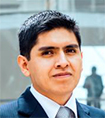
Alberto Torres Hinostroza
teacher of the subjects: Control Engineering, Mechatronics Engineering Project Workshop, Electrical Machines 2. Development of research projects, focused on Health, robotics and
automation.

Matteo Tuveri
is a theoretical physicist and a science communicator. He is a researcher at the University of Cagliari and the Cagliari Division of INFN in Physics Education Research and History of Contemporary Physics. He develops communication and teaching methodologies between art, technology, history, philosophy, and science to foster the learning of physics and train schoolteachers. His research also focuses on studying the cognitive mechanisms of learning, linking natural and mathematical languages to promote the conceptual understanding of physics. He collaborates with schools and institutions in regional and national contexts.

Klinge Villalba Condori
researcher on ICT in Pedagogical Processes of Science Teaching, Computational Thinking, Management of Virtual Environments for Learning, Initial Teacher Training.

Jonathan Villanueva-Tavira
was born in Mexico. He received his BS degree in Cybernetic Engineering. He obtained his Master’s degree in computer science with specialty in Artificial Intelligence from Centro Nacional de Investigacion y Desarrollo Tecnologico (Cenidet) and his PhD in Universidad Popular Autonoma del Estado de Puebla (UPAEP). He is currently a full-time professor at the Tecnológico Nacional de México, Campus Centro Nacional de Investigación y Desarrollo Tecnológico since 2024. He was also the founder of the Computer Student Branch Chapter and Computational Intelligence Chapter at the Cenidet. His areas of interest are Robotics, Artificial Neural Networks, Computer Vision and Hybrid Knowledge Based Systems. He received the 2005 Larry K. Wilson Regional Activities Award and IEEE Computer Society Richard E. Merwin Student Scholarship. He has presented several papers at national and international conferences. He is a chairman of RAS&CIS Joint Chapter of Morelos Section.

Giuliano Vivanet
is a Full Professor in the Department of Pedagogy, Psychology, and Philosophy at the University of Cagliari, Italy. He holds a PhD in Languages, Cultures, and Information and Communication Technologies from the University of Genoa. He serves as Vice President of the Italian Society for Learning and Education Informed by Evidence
(S.Ap.I.E.). His primary research interests include evidence-based education, methodologies for research synthesis in education, educational technology, and teacher training.
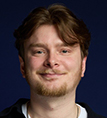
Joel Waye
Master’s student in Science in Engineering, Information and Communication Engineering Technologies at LTH, Faculty of Engineering. He designs Virtual Reality learning environments.

Daniel Zander
Master’s degree in Cognitive science, is a research assistant at the Choice blindness lab at Lund University Cognitive Science (LUCS). Daniel creates the conceptual designs of Virtual Reality environments aimed for high school education.
